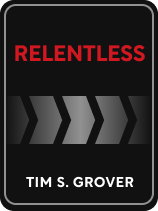

This article is an excerpt from the Shortform book guide to "Relentless" by Tim Grover. Shortform has the world's best summaries and analyses of books you should be reading.
Like this article? Sign up for a free trial here .
Is putting pressure on yourself a bad thing? Do people perform better under pressure?
Surprisingly, some people actually do work better under pressure. Putting pressure on yourself can help you manage stress and anxiety, while also making you relentless to succeed.
Here’s what Tim Grover, author of Relentless, says about the benefits of pressuring yourself.
Put Intense Pressure on Yourself
To develop an unstoppable need to succeed, you must constantly put intense pressure on yourself. In this article, we’ll look at Grover’s explanation for how putting pressure on yourself makes you consistently relentless, as well as how to apply this pressure productively to help you succeed.
How to Become Consistently Relentless
Grover agrees with the commonly observed phenomenon that people perform better under pressure and that being under pressure forces us to find ways to rise to whatever challenge we’re facing. In other words, constant pressure forces you to be constantly relentless—putting in everything you have to overcome obstacles and succeed.
(Shortform note: While many psychologists agree that pressure under certain circumstances will improve performance, it’s often in the context of short-term high-stress situations like a basketball game. However, in a longer-term context or in a field that doesn’t require immediate and precise action, psychologists disagree with Grover on the benefits of pressure. For example, one study found that increased pressure correlated with worse performance in math students. This research suggests that the extent to which pressure will benefit you is dependent on what your discipline requires.)
Constant pressure allows you to avoid the fear of failure and self-doubt in two different ways:
- It gives you lots of practice managing the fear and stress that comes with it, so you’ll improve at managing these feelings.
- Others depending on you or having high expectations of you won’t cause fear or panic because the pressure they put on you can’t be any more intense than the pressure you put on yourself.
(Shortform note: Psychological research agrees with Grover’s argument that using stress as a tool helps you succeed, and suggests that, beyond helping you avoid the fear of failure, it also benefits your mental and physical health. One study found that those who think of stress as a positive, motivating force focused less on negative emotion and had less cardiovascular stress.)
How to Productively Pressure Yourself
While pressure can help keep you relentless, Grover warns that you need to recognize the difference between productive and unproductive pressure. Pressure from your drive to succeed will help you stay relentless, while pressure from something like forgetting to do your work comes from a lack of commitment, and therefore doesn’t help you stay relentless.
Grover suggests two ways that you can consistently put yourself in situations of productive pressure: leading others and reframing your successes.
Lead Others: When you’re unstoppable, others will naturally see you as a leader—Grover notes that this is a great source of productive pressure. That’s because doing everything you can to succeed often requires using this leadership role to make sure the people around you perform at their highest possible level as well.
Reframe Success: The second way you can put more pressure on yourself is by changing the way you think about success. Instead of viewing it as an excuse to relax, success should increase the pressure you put on yourself. The principle of constantly seeking improvement means that each success is merely a step on your path towards unstoppable dominance in your field—not the destination. After each success, you’ll have to set your sights on the next, larger success instead of relaxing.

———End of Preview———
Like what you just read? Read the rest of the world's best book summary and analysis of Tim Grover's "Relentless" at Shortform .
Here's what you'll find in our full Relentless summary :
- The qualities you’ll need to become the best in your field
- Why sacrifices and discomfort are necessary for growth
- Why you should practice indulging in your primal self






